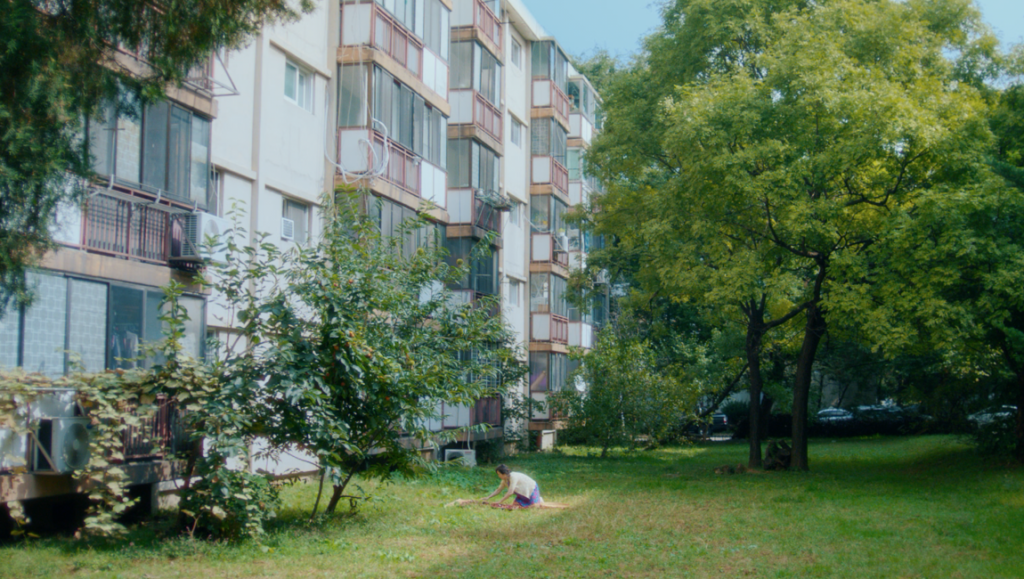Yoon Seo-jin’s debut feature Chorokbam opens ominously. After an aging nightwatchman (Lee Tae-hoon) investigates the loud meowing he overhears, he makes a grisly discovery on a nearby playground: a dead cat, cruelly hung up by its neck on a jungle gym. The man calmly buries the kitten and finishes his shift, heading home under the first rays of sunlight. It’s an opening sequence that recalls Gummo’s infamous cat-drowning scene in its jarring (but thankfully simulated) animal cruelty. Chorokbam’s episodic structure resembles the American underground classic’s loose vignettes as well, although Yoon does steer clear of Harmony Korine’s venomous and chaotic impulses, opting for a calmer, more controlled, and overall more coherent approach to this existential family drama.
The grim episode which opens the film turns out to be an eerie sign of things to come, as the man soon learns that his father has passed away. While him, his wife (Kim Min-kyung, who passed away in August of last year and to whom the film is dedicated), and their adult son (Kang Gil-woo) try to navigate this tragedy, their lives begin to unravel amongst economic anxieties, frequent fights, and festering unhappiness. The unfortunate family reunion at the deceased patriarch’s funeral devolves into petty squabbling that quickly escalates into physical violence, the deceased’s daughters lobbing insults, and eventually fists, at each other, before their brother finally intervenes. Since his sisters are unwilling, it falls on him and his reluctant wife to take care of his father’s estate. But as the months go on, mounting pressures, intense depression, and continued misfortune threaten to tear the family apart for good.
Though the death of the father is what kicks off the sparse narrative, the family unit at the center of the film has obviously had to contend with a myriad of issues for a while. The married couple leads a dreary and loveless life, the husband frequently complaining about his wife’s “bitching,” and the wife unhappy with the husband’s blasé, emotionless demeanor — a mask of detachment which hides a deep-seated pain and world-weariness, only made worse by his father’s death. Meanwhile, their son, unable to make ends meet on his salary as a social worker, lives with his parents, occasionally spending his nights at hotels so he can enjoy some free time with his girlfriend, and it’s unclear if the parents are even aware of his relationship. The two talk about getting married, which would enable them to own a home of their own, but their plans remain vague, buried under a layer of half-joking noncommitment. The characters’ conversations often revolve around money, homeownership, and their uneasiness about the future, reflecting ever-growing concerns over South Korea’s disappearing middle class.
But even with the potent socioeconomic subtext, Yoon’s primary concerns are more abstract. While green dominates the first-time writer-director’s frames (the film’s title translates to “green night”), its shades ranging from lush to sickly, he often contrasts the rich saturation of nature with the washed-out tones of the city. Composed by Hiroyuki Nagashima — known for his work on cult films such as 964 Pinocchio and August in the Water, as well as the “Cannon Fodder” segment from the underrated 1995 anime anthology Memories — the beautiful soundtrack similarly fades into silence every so often, to make room for the hectic urban soundscapes of busy streets, loudspeakers, and police sirens. However, the film generates its most pensive, mournful moments, whenever the two opposites coalesce, such as when the son smokes a cigarette at night, surrounded by the muted greenery of a park, the faint sounds of cars speeding by, and accompanied by Nagashima’s tender, melancholy arrangements.
Regrettably, Chorokbam does venture into overt sentimentalism from time to time, namely when the score lays on the emotionality rather thick, even if the scene would’ve been perfectly capable of communicating it on its own. This emotional bludgeoning act does get overbearing, but the film still shines with numerous genuinely affecting moments, and there’s a scene in particular that’s downright startling in its grotesque, twisted beauty. There are traces of the fantastical that only rarely reveal themselves, but which permeate the film’s anguished, oppressive atmosphere. Its deliberate pace might be off-putting to those hoping for more straightforward genre spectacle, but as a slow-burning drama with a subtle undercurrent of magical realism, Chorokbam offers a striking, if imperfect, experience.
Published as part of Fantasia Fest 2022 — Dispatch 4.


Comments are closed.